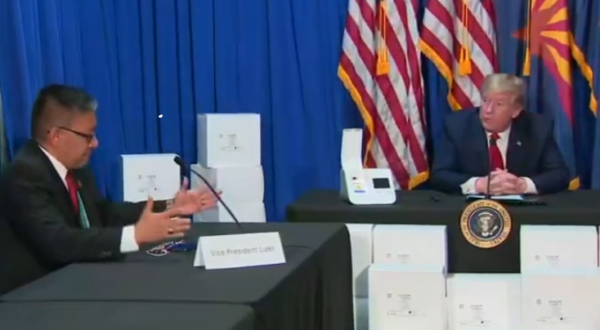
- Details
- By Levi Rickert
PHOENIX — What was billed on Tuesday as a Native American town hall with the President of the United States turned out to be a 21-minute discussion between leaders from two Arizona tribes, President Donald Trump and Arizona Gov. Doug Ducey.
Navajo Nation Vice President Myron Lizer and his wife, Dottie, joined the meeting with the President, as did Gila River Indian Community Governor Stephen Roe Lewis. Also in attendance were Labor Secretary Eugene Scalia and Sen. Martha McSally (R-AZ).
The discussion centered on the impact of the COVID-19 pandemic in Indian Country, the distribution of CARES Act relief funds for tribal governments, and missing and murdered Indigenous women and girls.
Trump said he understands tribes have been hit hard by the coronavirus.
Vice President Lizer discussed how the deadly virus has hit the Navajo Nation hard.
The Navajo Nation is the epicenter of the deadly virus among tribal nations. As of Tuesday, the Navajo Nation reported it has more than 2,500 positive confirmed coronavirus cases and had 79 coronavirus related deaths.
Trump took the opportunity to tout how his administration was disbursing $600 million for the Navajo Nation and $40 million for the Gila River Indian Community. He was referring to part of the $8 billion Congress approved as part of the CARES Act funds designated for tribes.
The release of the funds was announced earlier on Tuesday, prior to Trump’s arrival in Phoenix for the discussion. On Tuesday morning, the Treasury Department and the Department of the Interior announced its distribution plan that releases 60 percent—or $4.8 billion—of the funds later this week. The funds tangled in litigation have been a source of contention among tribes.
"Indian tribes can’t wait for that litigation to end before additional payments are made to us from the fund. If you can, please direct the Treasury to make these payments as soon as possible," Gov. Lewis told the president.
Towards the end of the discussion the president signed a proclamation for “Missing and Murdered American Indians and Alaska Native Awareness Day.”
“On behalf of the Navajo people, we commend President Trump and his administration for recognizing the traumatic epidemic of missing and murdered Indigenous relatives along with tribal communities throughout the country, especially during the COVID-19 pandemic. There is a need for great awareness to protect our sacred and precious relatives, and to honor survivors and victims who are impacted,” Vice President Lizer said after the meeting.
The proclamation declares May 5, 2020 as The Missing and Murdered American Indian and Alaska Natives Awareness Day, and calls upon all Federal, State, tribal, and local governments to increase awareness of the crisis through appropriate programs and activities.
Trump also took the opportunity to talk about the wall being erected at the southern border and how everyone appreciates it. However, the Tohono O’odham Tribe, located at the southern border, has been resentful of the desecration of sacred American Indian sites. It was not clear if Tohono O’odham tribal leaders were invited to be part of Tuesday’s discussion.
The discussion was held at a Honeywell International plant near the Phoenix airport and was the first trip Trump has taken in several weeks due to the isolation guidelines set forth by his administration to help stop the spread of COVID-19.
More Stories Like This
Native News Weekly (August 25, 2024): D.C. BriefsUS Presidents in Their Own Words Concerning American Indians
Two Murdered on Colville Indian Reservation
NDAA passes House; Lumbee Fairness Act Advances
NFL, Vikings to Host Native All-American Game, Youth Flag Clinic
Help us defend tribal sovereignty.
At Native News Online, our mission is rooted in telling the stories that strengthen sovereignty and uplift Indigenous voices — not just at year’s end, but every single day.
Because of your generosity last year, we were able to keep our reporters on the ground in tribal communities, at national gatherings and in the halls of Congress — covering the issues that matter most to Indian Country: sovereignty, culture, education, health and economic opportunity.
That support sustained us through a tough year in 2025. Now, as we look to the year ahead, we need your help right now to ensure warrior journalism remains strong — reporting that defends tribal sovereignty, amplifies Native truth, and holds power accountable.
 The stakes couldn't be higher. Your support keeps Native voices heard, Native stories told and Native sovereignty defended.
The stakes couldn't be higher. Your support keeps Native voices heard, Native stories told and Native sovereignty defended.
Stand with Warrior Journalism today.
Levi Rickert (Potawatomi), Editor & Publisher

